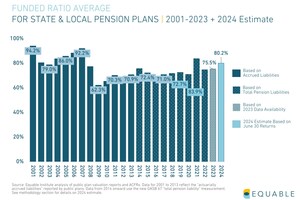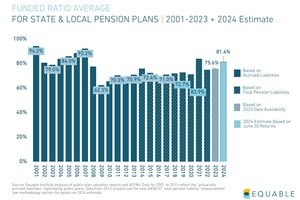NEW YORK, June 24, 2021 /PRNewswire/ -- A new report from Equable Institute measuring the adequacy of state retirement benefits for public sector workers finds that the largest segments of new and recently hired employees are not being served well by their retirement plans. This includes most short-term workers (the 55% of employees who will leave before 10 years of service) and medium-term workers (the 25% of employees who will serve between 10 and 20 years). The report also reveals that 3 of 4 statewide public retirement plans provide adequate retirement income for full career workers, regardless of plan type, provided they spend their entire career enrolled in the same plan.
The Retirement Security Report is an interactive, digital evaluation of the quality of retirement benefits offered to public workers nationwide using customizable score cards for all 335 statewide retirement plans currently open to new hires. While most analyses of public retirement plans focus on the sustainability of public retirement systems and their costs, the Retirement Security Report is focused on the value of benefits being offered to public sector workers to determine if individual plans are providing a path to retirement income security for municipal employees, public safety officers, state workers, and teachers based on career tenure and age.
"Public workers are individuals with unique needs, just like everyone else. It is important that their retirement benefits are working well for them, no matter how long they work in public service," said Equable Institute Executive Director Anthony Randazzo. "Retirement plans should prioritize putting their members on a path to adequate retirement income security. For this report, we've defined adequacy as being provided with least 70% of pre-retirement income by age 67. But in reality, what will count as adequate retirement income is going to vary from person to person, and household to household."
While the Retirement Security Report finds that most short- and medium-term workers are not being served well by their retirement plans, the report also dispels entrenched myths surrounding retirement plan types. Specifically, it finds:
- When measured against the benchmark of achieving 70% replacement of pre-retirement income, pension, defined contribution (DC), guaranteed return (GR), and hybrid plans can all be designed to serve Full Career Workers well.
- Pension plans can work for Short-Term Workers (10 years or less), when there is a high member contribution rate and a high interest rate on those contributions when they are withdrawn from the system and rolled over to another employer.
- Some of the best-performing plans are DC plans for Full Career Workers. A key feature of these plans is that they have relatively high contribution rates, such as South Carolina's 14% of total payroll contributions for state, local, and public school workers.
- Guaranteed Return and Hybrid Plans that combine elements of guarantees and individual accounts perform worse on average than straightforward pensions and DC plans. They provide trade-offs for members who want to balance risk and agency, so they may still be optimal for certain workers whose risk tolerance is willing to accept slightly lower-valued benefits.
The Retirement Security Report is a living project and Equable Institute will continue to add municipal and legacy plans to its database. To dive deeper into the findings of the Retirement Security Report, visit RetirementSecurity.Report to explore individual plans' scores, download the summary report and access Equable Institute's open-source data.
About Equable Institute
Equable is a bipartisan non-profit that works with public retirement system stakeholders to solve complex pension funding challenges with data-driven solutions. We exist to support public sector workers in understanding how their retirement systems can be improved, and to help state and local governments find ways to both fix threats to municipal finance stability and ensure the retirement security of all public servants.
Equable.org | Twitter: @EquableInst | Facebook: @EquableInstitute | Instagram: @EquableInst
SOURCE Equable Institute

Related Links
WANT YOUR COMPANY'S NEWS FEATURED ON PRNEWSWIRE.COM?
Newsrooms &
Influencers
Digital Media
Outlets
Journalists
Opted In





Share this article